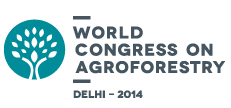Engagement of private sector in REDD+: issues, opportunities and challenges
Engagement of private sector in REDD+: issues, opportunities and challenges
wca2014-2097 Isilda Nhantumbo 1,*Marisa Camargo 2 1Natural Resources, 2International Institute for Environment and Development, Edinburgh, United KingdomREDD+ is rapidly evolving in several countries supported through the Forest Carbon Partnership Facility (FCPF) managed by the World Bank and the United Nations REDD Program (UN-REDD). Concomitantly with national-level and government-led processes towards development of strategies for REDD+ and creating the legal and institutional enabling conditions for performance-based payments, several institutions including the voluntary and for-profit sectors are involved in REDD+ implementation at different scale and using different models.
The early engagement of private sector in climate change mitigation and adaptation efforts is fundamental for demonstrating how the sector can draw upon its market-based know-how and financing to take risks and venture into reducing emissions endeavours as providers/suppliers, buyers, or simply investing capital in companies doing either. There is, however, debate about private sector engagement in REDD+ with some concerned about the robustness of the policy and legal systems for ‘investing’ in ecosystems services commodities such as carbon, tenure arrangements, benefit-sharing, undertaking of free, prior and informed consent processes for local buy-in and participation, the extent and tools used for addressing drivers of deforestation and forest degradation, taxation of income from regulating services.
To help understand the scale of private sector engagement in REDD+ and analyse the issues we constructed a database of 115 initiatives in Africa, Asia and Latin America. The paper starts with a brief analysis of the private sector players in REDD+, also focusing on who the developers and beneficiaries are, their geographical distribution (countries), and their motivations or objectives as well as the main activities being undertaken for reducing emissions. The paper then provides an analysis of rights to carbon and benefit-sharing. A case study of the Democratic Republic of Congo complements these analyses, providing further insights of a policy and institutional framework that is being used for engagement of for-profit sector in REDD+.

